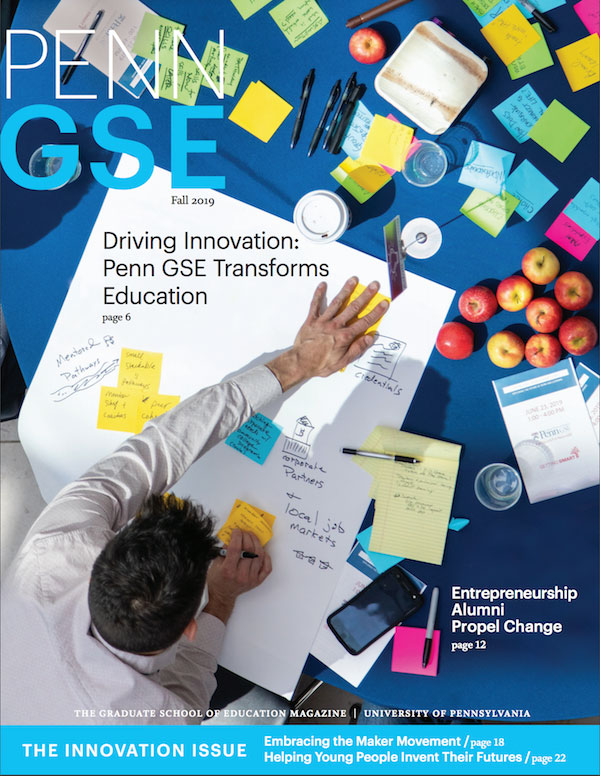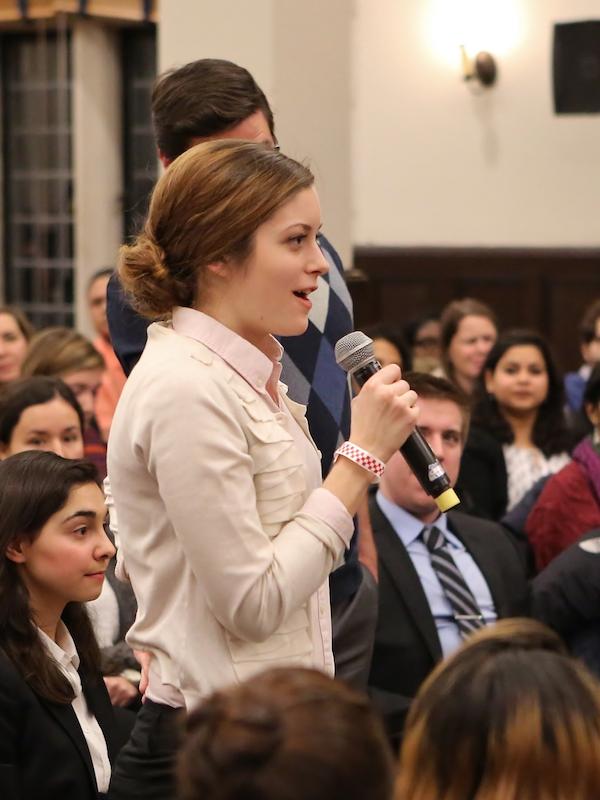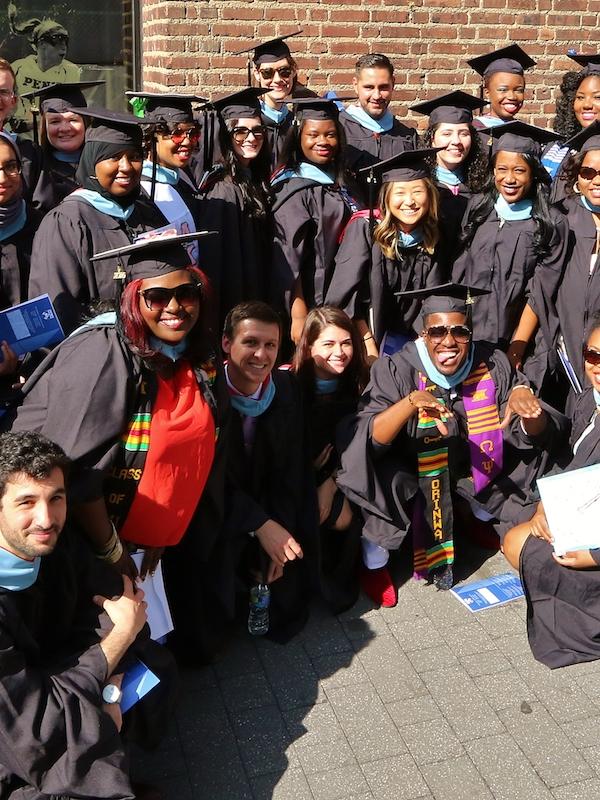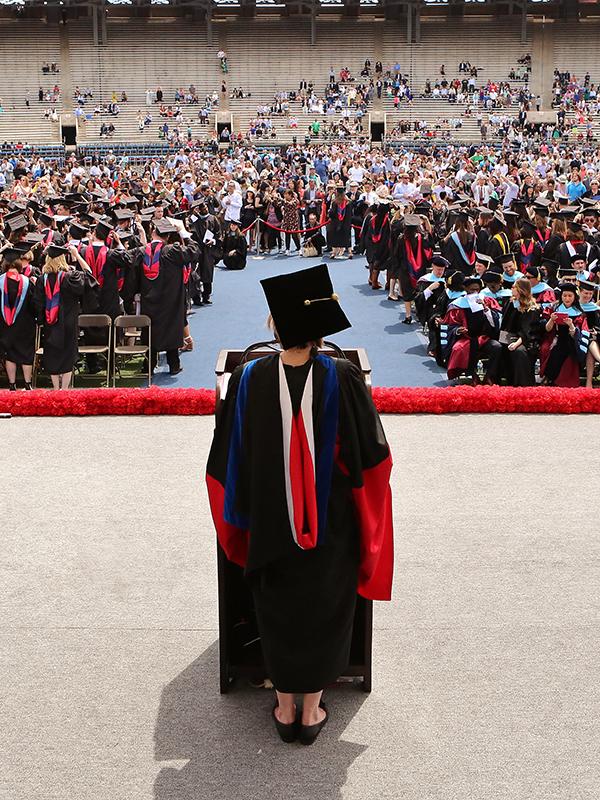Driving Innovation: Penn GSE Transforms Education for a Changing World

Photo by iStock.com/Varunyu
by Juliana Rosati
A pioneer of innovation in education, Penn GSE boasts a twenty-year legacy of re-envisioning teaching and learning, solving problems on the ground in classrooms and schools, fostering new businesses and ventures, and translating research to practice.
“Penn GSE constantly strives to reimagine learning and anticipate the leading edge of education,” says Dean Pam Grossman. “Our innovative approach yields programs and initiatives that are built for agility, so that we can ensure our relevance to practitioners and the communities they serve.”
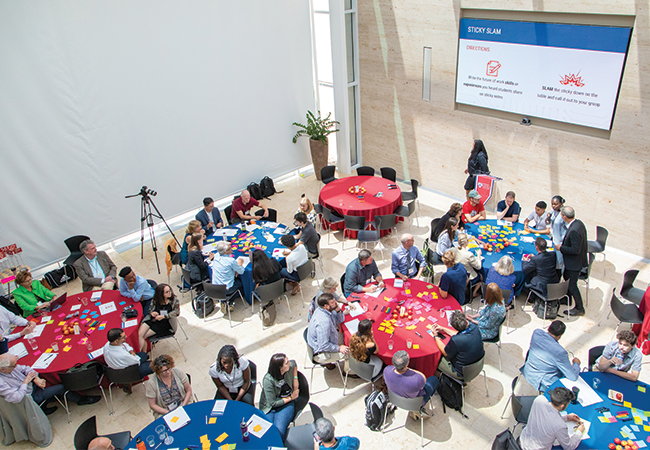
With the launch of the School’s first executive-format programs more than two decades ago, Penn GSE rose to the challenge of preparing educators for new and growing fields, assembling a distinctive array of Ed.D. and master’s programs for working professionals. The School’s renowned efforts to foster entrepreneurs began in 2010 with the launch of the Milken-Penn GSE Education Business Plan Competition, the first competition of its kind at an education school, and intensified with the launch of the world’s first master’s degree program in education entrepreneurship in 2014 and the first global certificate in education innovation in 2019.
Today these and other groundbreaking programs and initiatives are advancing the School’s role as a force for change in education. “We are bringing stakeholders from within and outside of Penn GSE together to create transformative learning opportunities for people in Philadelphia, across the country, and around the globe,” says Michael Golden, GRD’07, executive director of Catalyst @ Penn GSE, the School’s new hub for education innovation.
Whether by galvanizing urgent conversations, empowering educators, inspiring entrepreneurs, or propelling innovative degree programs, Penn GSE is at the forefront of transforming education for a changing world.
Catalyzing Change
“Given the rapid pace of change in the workplace and our world, we expect huge disruption in how, where, and why we educate young people.” —Catalyst Executive Director Michael Golden, GRD’07
How can education prepare students for a future in which the pace of change is faster than anything humans have experienced? What skills will be most in demand once breakthroughs in artificial intelligence, robotics, 3D printing, and other technologies have transformed multiple industries? Participants sought to answer questions like these at “Exploring the Future of Work and Learning,” an event convened in June by Catalyst.
“We identified key visionaries and innovators to discuss how education can transform to meet the needs of the future,” says Dr. Golden. “Given the rapid pace of change in the workplace and our world, we expect huge disruption in how, where, and why we educate young people.”
At the event, multicolored sticky notes dotted the walls and tablecloths at Penn’s Perry World House as high school students, education leaders, entrepreneurs, and workforce developers gathered to identify twenty-first-century skills and envision how to impart them to learners of all ages.
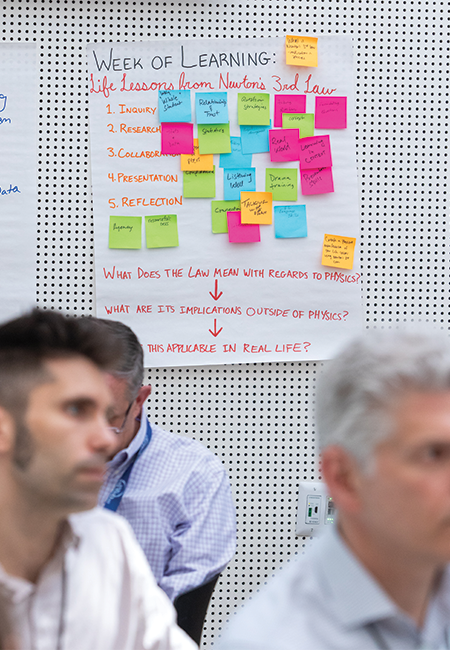
“We need to create classrooms that prepare students to gain the capacity to be nimble and flexible, to learn how to learn, and develop new skills,” says Dean Grossman.
Twenty-first-century skills such as collaboration, communication, problem solving, relationship building, project management, entrepreneurship, and design thinking quickly became the focus of conversation at the event. Teams brainstormed active learning opportunities for students in K–12, adult, postsecondary, and higher education.
“It was a chance to make sure we keep pushing around innovation, so we don’t miss the opportunity for the people we serve,” says participant Patrick Clancy, president and CEO of Philadelphia Works Inc. As the city’s workforce development board, Philadelphia Works oversees how the city invests federal funds to help people gain training and skills to enter the workforce after periods of unemployment, serving approximately fifty thousand individuals per year.
By convening key leaders for forward-thinking conversations and undertaking a host of other initiatives to spur entrepreneurship and create models for change at school, district, and national levels, Catalyst strives to reimagine how universities can solve problems on the ground. Launched in 2017, Catalyst is building and expanding upon the advances of the former Office of Academic Innovation led by Barbara “Bobbi” Kurshan.
“Our work is all geared to coalescing forces to improve the educational system,” says Dr. Golden. Through a new series of problem-solving initiatives, or inquiries, in schools, Catalyst is creating a two-way exchange with educators. “We start by going out into the field and working with them to identify their biggest problems,” says Golden.
“We need to create classrooms that prepare students to gain the capacity to be nimble and flexible, to learn how to learn, and develop new skills.” —Penn GSE Dean Pam Grossman
Inquiries have addressed topics such as students’ sense of belonging, mathematics instruction, and the use of data by school districts. The latter grew out of the concerns of the South Jersey Data Leaders Partnership (SJDLP), a network of forty-five school districts in New Jersey.
“There is a real void in terms of how educators are prepared to work with data,” says SJDLP President Marc Mancinelli, GED’07, GED’08, GRD’14, director of curriculum and instruction at Lindenwold Public Schools. Data can be a powerful tool for understanding a school’s community and performance, Mancinelli says, yet educators often lack the skills and confidence to use it well.
A team from Catalyst helped SJDLP conduct a survey to gauge member districts’ capacities for data use. “Catalyst provided the structure of a research-based inquiry cycle, where you take the baseline information, envision where you want to be, and form a plan to get there,” says Mancinelli. As Catalyst and SJDLP enter the second year of their partnership, Mancinelli looks forward to helping districts implement interventions.
Catalyst’s new initiatives also include expanding the reach of Penn GSE’s certificate programs and webinars, with the understanding that for many educators, time, costs, and geography are barriers to enrolling in a degree program. In this vein, Catalyst recently partnered with Aditya Birla Education Academy (ABEA) in India to provide a customized version of Penn GSE’s VOLT (Virtual Online Learning and Teaching) certificate program, launched in 2014 as the first program of its kind.
“Change is the only constant in today’s world, and more than anyone, the teacher must be well acquainted with change,” says Neerja Birla, chairperson of ABEA, which was founded by the Mumbai-based multinational conglomerate Aditya Birla Group.
To help ABEA address a lack of professional development for teachers in India and prepare educators to use technology more effectively in the classroom, Betty Chandy, GED’05, GRD’13, Catalyst’s director for online learning, adapted VOLT to meet ABEA’s needs.
According to Surabhi Goel, CEO of ABEA, the result was a powerful learning experience. “A lot of the teachers’ habits and beliefs were shaken up, and they had to unlearn and relearn some concepts. Penn GSE was able to make that happen for them,” she says. As the partnership enters its second year, Goel notes that ABEA is eager to expand the program. “There are so many people who really need this training,” she says.
Fostering Entrepreneurship
Working directly with practitioners is one unconventional way that a university can solve problems in education. Propelling new businesses and ventures—digital learning platforms, college funding innovations, school designs, and more—is another.
As Catalyst celebrates the tenth year of the Milken-Penn GSE Education Business Plan Competition (EBPC), a competition open to entrepreneurs around the world, it is recognizing the considerable accomplishments of past winners (see “Celebrating Ten Years of Entrepreneurship” below), introducing a semifinalist round, and offering a robust, year-round series of boot camps and webinars for entrepreneurs within and beyond the competition.
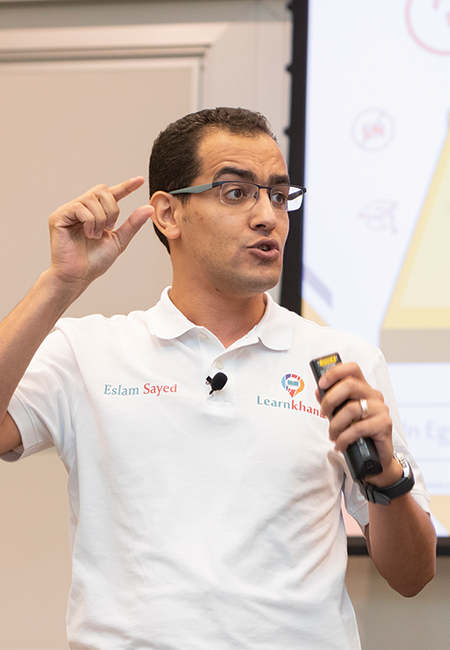
When EBPC semifinalists are named in April, they gain free access to the boot camps and webinars as they prepare for the October finalist competition. The programs cover topics such as how to develop a pitch, hone a business idea, demonstrate a product’s impact, and sell into the U.S. education marketplace. “We focus on the most crucial skills that entrepreneurs need to develop and the key knowledge required for success,” says Golden. “We’re providing opportunities to strengthen your business through networking with Catalyst’s ecosystem of researchers, investors, and other professionals.”
Working alongside Catalyst, Penn GSE’s Education Entrepreneurship master’s program seeks to create a culture of sustainable problem solving and global impact. Its students, who hail from a variety of industries and backgrounds, each build an education venture during the program’s thirteen months. The program’s executive format combines weekend on-campus sessions and virtual learning to meet the needs of working professionals.
“Between Catalyst and the Education Entrepreneurship program, we are proud to be building and propelling a dynamic community of people who seek to make change through new ventures,” says Dr. Grossman.
Since its launch five years ago, the Education Entrepreneurship program has doubled in size. Its nearly 150 alumni have created as many education enterprises, founded new schools and programs on five continents, launched education startups, and led entrepreneurial activities in schools, businesses, governments, and communities. The program’s graduates now represent twenty-five countries.
“Each year we see how our students use the power of education knowledge, business skills, and entrepreneurial thinking to find really novel solutions that help kids learn and thrive,” says Penn GSE Senior Fellow Jenny Zapf, the program’s director.
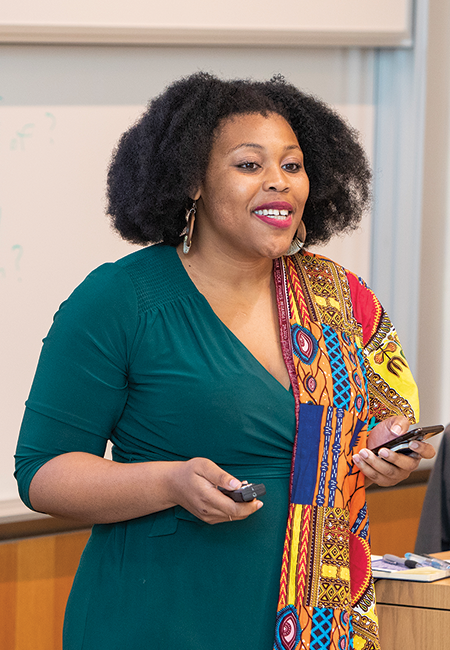
At the program’s concluding Demo Day in 2019, students pitched their ventures to a panel of judges, offering an array of solutions to problems in education around the world. Ventures included a charitable foundation that invests in the skill sets of talented youth living in vulnerable U.S. communities, a program to connect U.S. students with meaningful study abroad opportunities in Africa, a mobile platform to help parents in Ghana and Nigeria plan college funding for their children, an online platform to connect instructors and learners in Egypt for professional training, and a project-based school emphasizing agricultural entrepreneurship in Zimbabwe.
Dr. Zapf views the program itself as an education startup to be continually and rigorously tested and improved. Drawing upon problem-solving methods from the fields of design, business, and engineering, the program implements changes on a small scale to gauge their efficacy. Zapf estimates that at any given moment, ten “design experiments” are underway—components of the curriculum are launched for a short time, assessed through student and faculty feedback, and improved or replaced. For example, rapid testing and feedback yielded a new approach for mentoring students and a new design lab for education innovation. “I believe that you teach entrepreneurial thinking and design by creating experiential learning opportunities where people grapple with problem-solving and uncertainty,” says Zapf.
With this approach, each year of the program has differed significantly from the last, and students have become co-creators of the experience. Students have also made the program distinctive through their varied backgrounds. In recent cohorts, 60 percent have been people of color, more than 60 percent have been women, 25 percent have come from lower-income backgrounds, and 20 percent have been international. “The diversity of the student body provides a robust and rigorous learning environment, with tremendous differences in perspective and a strong focus on how education solutions can meet the needs of underrepresented communities,” says Zapf.
As students graduate, they enter a burgeoning community of alumni poised to sustain their work through partnerships and networking. “Our students and alumni are creating a new movement in education, supporting one another as they take on some of the hardest work possible—creating better and sustainable futures for our kids and communities,” says Zapf.
Celebrating Ten Years of Entrepreneurship
Now in its tenth year, the Milken-Penn GSE Education Business Plan Competition (EBPC) has identified fifty winning ventures and awarded more than $1.4 million in cash and prizes. Previous winners and finalists have raised an additional $140 million in funding since competing. They have also been named to Forbes’ 30 Under 30 list, featured on “Shark Tank,” listed on Fast Company’s World’s Top 10 Most Innovative Companies in Africa, and named to President Obama’s Advisory Council on Financial Capability for Young Americans. Here, a few reflect upon the competition:
Osmosis, 2014 Winner
Through a video library and learning platform, Osmosis seeks to empower clinicians and caregivers to gain and update medical knowledge. “The impact Penn GSE’s EBPC had on our business was significant,” says cofounder Shiv Gaglani. “Our customers, both direct users and institutions, felt validated in choosing us when we were recognized by Penn GSE for our work.”
InferCabulary, 2016 Chancelight Award Winner
An interactive, web-based K–12 literacy program, InferCabulary teaches vocabulary in a way that engages critical thinking. Cofounder Beth Lawrence says, “It’s prestigious to be chosen to compete at the EBPC final event, and it’s an asset to have access to that network. We competed with people from around the globe, and saying we’re winners of the Penn GSE EBPC has been invaluable.”
Caribu, 2017 Finalist
An app that helps parents, family, and mentors read and draw with children via a video call, Caribu was selected as one of eight finalists of SXSW EDU 2019. “As someone who has been a winner or finalist in twenty competitions, I can say that the team at Penn GSE and the caliber of people they brought in were extremely impressive,” says CEO Maxeme Tuchman.
Visit www.educationcompetition.org/ alumni-profiles to find more EBPC participants’ stories.
Improving Learning in a Changing World
Across the School, a spirit of innovation ensures the vibrancy of Penn GSE’s work. Other executive-format programs, including the Mid-Career Doctoral Program in Educational Leadership and the PennCLO (Chief Learning Officer) program, fortify their relevance to working professionals by evolving their offerings in response to student feedback. The Collaboratory for Teacher Education, which encompasses all of Penn GSE’s teacher education programs and includes faculty, staff, and doctoral students, is exploring innovative approaches to teacher preparation. The Collaboratory is currently placing a focus on improving mentoring for prospective teachers and equity and inclusion in teacher education programs. The Consortium for Policy Research in Education (CPRE), a community of researchers from renowned research institutions and schools of education based at Penn GSE, is fostering interdisciplinary dialogue among researchers, policymakers, and practitioners through the CPRE Knowledge Hub Research Minutes podcast located at www.researchminutes.org and other openly accessible programming.
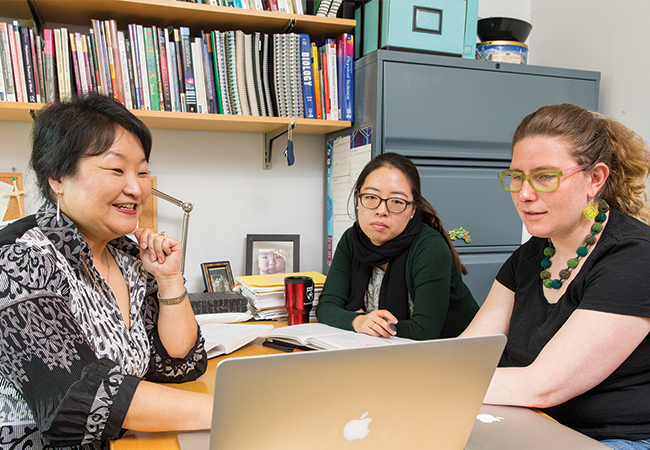
In Penn GSE’s Learning Sciences and Technologies program, record enrollment and distinctive faculty expertise are putting the School at the forefront of a field that is shaping what learning looks like in a changing world.
“This is a field that strives to make real-world changes through innovative experiences and tools that respond to current needs in our society,” says Professor Susan Yoon, one of the program’s three primary faculty members. “It also fosters a mindset of creativity, problem solving, and critical thinking.” Dr. Yoon works with Associate Professor Ryan S. Baker, Lori and Michael Milken President’s Distinguished Professor Yasmin B. Kafai, and other colleagues to prepare master’s students in the program for careers as educators, researchers, and curriculum developers.
With expertise that spans a number of hot topics in education, including data, computing, makerspaces, science, and digital tools, Drs. Yoon, Baker, and Kafai have generated over $30 million in research funding from organizations including the National Science Foundation, the U.S. Department of Education, the MacArthur Foundation, the Spencer Foundation, the Bill & Melinda Gates Foundation, Google, IBM, and Lenovo.
Baker applies his expertise in big data and data literacy to study how learning unfolds in a variety of formats, including online environments like massive open online courses (MOOCs), traditional classroom instruction, and classrooms equipped with technology. As director of the Penn Center for Learning Analytics, he works with a team to analyze student behavior and performance, applying the powerful computing techniques of data mining. “With traditional research methods, typically you can only ask one question at a time,” says Baker, a recipient of the 2018 Educational Research Award from the Council of Scientific Society Presidents. “With data mining, if you have enough data, you can ask ten thousand questions at a time.”
Kafai, world-renowned as a pioneer of computer science and makerspaces, develops curricula that engage students in creative work while they learn skills in coding and design. Her curriculum in electronic textiles, “Stitching the Loop,” is being implemented in school districts across the country and aims to bring underrepresented groups like girls and students of color into computing. “Creating is a very powerful way of learning because it helps you to externalize your thinking,” explains Kafai. “You create something that is shareable and visible. Your teacher and peers can interact with it, and this gives rise to great conversations.”
Yoon, named a 2019 Fellow of the International Society of the Learning Sciences in recognition of major contributions to the learning sciences, works at the nexus of science education and digital tools. Her current project in the emerging field of bioinformatics is helping teachers prepare students for active citizenship and STEM careers.
“Bioinformatics is really about the use of computers in biology,” says Yoon. “You can detect patterns in thousands or millions of data points to inform medical therapies and solutions.”
“Penn GSE constantly strives to reimagine learning and anticipate the leading edge of education. Our innovative approach yields programs and initiatives that are built for agility, so that we can ensure our relevance to practitioners and the communities they serve.” —Penn GSE Dean Pam Grossman
With funding from the National Science Foundation, Yoon and partners at Penn Medicine and the Institute for Biomedical Informatics are preparing a group of teachers from The School District of Philadelphia to create curricula in bioinformatics. Students will design mobile applications to study air quality and how it can be improved, focusing on the locally relevant issue of pollution’s role in asthma. “Students will construct solutions that will make a difference in their community,” says Yoon. “We’re teaching about the latest and greatest applications of technology in big data and data literacy.”
She envisions eventually rolling out the bioinformatics program on a larger scale, much as one of her earlier projects, BioGraph, recently became a MOOC available to educators internationally. As a partner in BioGraph, Yoon collaborated with MIT’s Scheller Teacher Education Program to help teachers integrate coding and visual simulations into biology lessons. BioGraph has been shown to produce a threefold increase in students’ understanding of complex scientific systems like ecosystems and human respiration.
By studying educational environments and partnering with teachers to create professional development, Yoon and her colleagues in the Learning Sciences and Technologies program increase access to cutting-edge opportunities that schools often lack the resources to implement. “Teachers are yearning to teach with progressive pedagogies and tools, but without an advocate like us and high-quality professional development, education is hard-pressed to improve,” she says.
Looking Ahead
As Penn GSE continues partnering with practitioners and producing graduates who are equipped to shape education in powerful new ways, the future is as bright as the School's legacy of innovation.
“We are convening people and ideas for disruptive change,” says Golden. Catalyst is developing new resources, pathways, and conversations to solve problems and anticipate the future of education. The Education Entrepreneurship program is expanding its global reach through a three-to-five-day on-site certificate in education innovation, first offered in San Francisco and Tel Aviv, and scheduled to launch in Dubai, Mumbai, and China in the spring. The Learning Sciences and Technologies program is exploring potential new offerings. And faculty, staff, and students across the School remain tireless in their efforts to improve education.
“Innovation is a part of everything we do,” says Grossman. “It’s a mindset that we cultivate across Penn GSE—asking what will be the next frontier in education and how we can leverage our expertise to prepare for it.”
This article originally appeared in the Fall 2019 issue of The Penn GSE Magazine.

